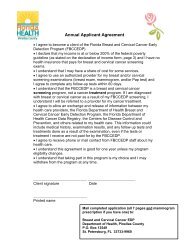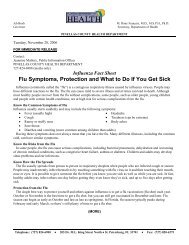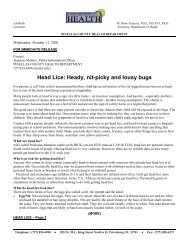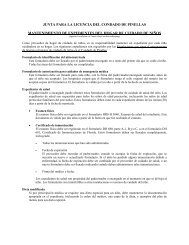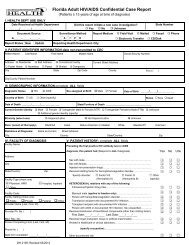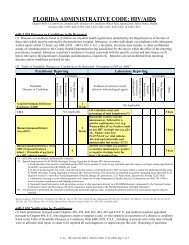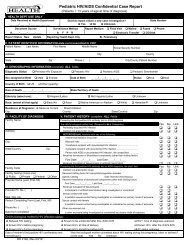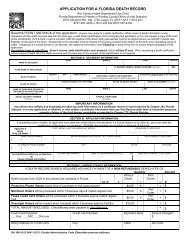Rabies Vaccine - Pinellas County Health Department
Rabies Vaccine - Pinellas County Health Department
Rabies Vaccine - Pinellas County Health Department
Create successful ePaper yourself
Turn your PDF publications into a flip-book with our unique Google optimized e-Paper software.
4 Tell your doctor if . . .<br />
Talk with a doctor before getting rabies vaccine if<br />
you:<br />
1) ever had a serious (life-threatening) allergic<br />
reaction to a previous dose of rabies vaccine, or to<br />
any component of the vaccine,<br />
2) have a weakened immune system because of:<br />
- HIV/AIDS or another disease that affects the<br />
immune system,<br />
- treatment with drugs that affect the immune<br />
system, such as steroids,<br />
- cancer, or cancer treatment with radiation or<br />
drugs.<br />
If you have a minor illness, such as a cold, you can<br />
be vaccinated. If you are moderately or severely ill,<br />
you should probably wait until you recover before<br />
getting a routine (non-exposure) dose of rabies<br />
vaccine.<br />
If you have been exposed to rabies virus, you<br />
should get the vaccine regardless of any other<br />
illnesses you may have.<br />
5<br />
What are the risks from<br />
rabies vaccine?<br />
A vaccine, like any medicine, is capable of causing<br />
serious problems, such as severe allergic reactions.<br />
The risk of a vaccine causing serious harm, or death,<br />
is extremely small. Serious problems from rabies<br />
vaccine are very rare.<br />
Mild problems:<br />
• soreness, redness, swelling, or itching where the<br />
shot was given (30% - 74%)<br />
• headache, nausea, abdominal pain, muscle aches,<br />
dizziness (5% - 40%)<br />
Moderate problems:<br />
• hives, pain in the joints, fever (about 6% of booster<br />
doses)<br />
• illness resembling Guillain-Barré Syndrome<br />
(GBS), with complete recovery (very rare)<br />
Other nervous system disorders have been reported<br />
after rabies vaccine, but this happens so rarely that it<br />
is not known whether they are related to the vaccine.<br />
<strong>Rabies</strong> <strong>Vaccine</strong> (1/12/06) <strong>Vaccine</strong> Information Statement<br />
NOTE: Several brands of rabies vaccine are available<br />
in the United States, and reactions may vary between<br />
brands. Your provider can give you more information<br />
about a particular brand.<br />
6<br />
What if there is a moderate or<br />
severe reaction?<br />
What should I look for?<br />
• Any unusual condition, such as a high fever or<br />
behavior changes. Signs of a serious allergic<br />
reaction can include difficulty breathing, hoarseness<br />
or wheezing, hives, paleness, weakness, a fast<br />
heart beat or dizziness.<br />
What should I do?<br />
• Call a doctor, or get the person to a doctor right<br />
away.<br />
• Tell your doctor what happened, the date and time<br />
it happened, and when the vaccination was given.<br />
• Ask your doctor, nurse, or health department to<br />
report the reaction by filing a <strong>Vaccine</strong> Adverse<br />
Event Reporting System (VAERS) form.<br />
Or you can file this report through the VAERS<br />
website at www.vaers.hhs.gov, or by calling<br />
1-800-822-7967.<br />
VAERS does not provide medical advice.<br />
7 How can I learn more?<br />
• Ask your doctor or nurse. They can give you the<br />
vaccine package insert or suggest other sources of<br />
information.<br />
• Call your local or state health department.<br />
• Contact the Centers for Disease Control and<br />
Prevention (CDC):<br />
- Visit CDC’s rabies website at<br />
www.cdc.gov/ncidod/dvrd/rabies<br />
department of health and human services<br />
Centers for Disease Control and Prevention<br />
National Immunization Program



